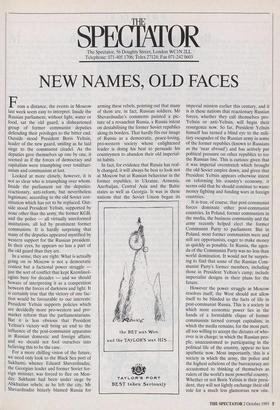SPECTAT THE OR
The Spectator, 56 Doughty Street, London WCIN 2LL Telephone: 071-405 1706; Telex 27124; Fax 071-242 0603
NEW NAMES, OLD FACES
From a distance, the events in Moscow last week seem easy to interpret. Inside the Russian parliament, without light, water or food, sat the old guard, a disheartened group of former communist deputies defending their privileges to the bitter end. Outside stood President Boris Yeltsin, leader of the new guard, smiling as he laid siege to the communist citadel. As the deputies gave themselves up one by one, it seemed as if the forces of democracy and capitalism were triumphing over totalitari- anism and communism at last.
Looked at more closely, however, it is not so clear who is triumphing over whom. Inside the parliament sat the deputies: reactionary, anti-reform, but nevertheless legitimate, according to the old Soviet con- stitution which has yet to be replaced. Out- side stood President Yeltsin, supported by none other than the army, the former KGB, and the police — all virtually unreformed institutions, all led by prominent former communists. It is hardly surprising that many of the deputies appeared mystified by western support for the Russian president. In their eyes, he appears no less a part of the old guard than they are.
In a sense, they are right. What is actually going on in Moscow is not a democratic contest but a factional power struggle — just the sort of conflict that kept Kremlinol- °gists busy for decades — and we should beware of interpreting it as a competition between the forces of darkness and light. It is certainly true that the victory of one fac- tion would be favourable to our interests: President Yeltsin supports policies which are decidedly more pro-western and pro- market reform than the parliamentarians. But it is less obvious that President Yeltsin's victory will bring an end to the influence of the post-communist apparatus in Russian domestic and foreign affairs, and we should not fool ourselves into believing this to be the case.
For a more chilling vision of the future, we need only look to the Black Sea port of Sukhumi; whence Eduard Shevardnadze, the Georgian leader and former Soviet for- eign minister, was forced to flee on Mon- day. Sukhumi had been under siege by Abkhazian rebels; as he left the city, Mr Shevardnadze bitterly blamed Russia for
arming these rebels, pointing out that many of them are, in fact, Russian soldiers. Mr Shevardnadze's comments painted a pic- ture of a revanchist Russia, a Russia intent on destabilising the former Soviet republics along its borders. That hardly fits our image of Russia as a democratic, peace-loving, pro-western society whose enlightened leader is doing his best to persuade his countrymen to abandon their old imperial- ist habits.
In fact, for evidence that Russia has real- ly changed, it will always be best to look not at Moscow but at Russian behaviour in the former republics, in Ukraine, Armenia, Azerbaijan, Central Asia and the Baltic states as well as Georgia. It was in these nations that the Soviet Union began its imperial mission earlier this century, and it is in these nations that reactionary Russian forces, whether they call themselves pro- Yeltsin or anti-Yeltsin, will begin their resurgence now. So far, President Yeltsin himself has turned a blind eye to the mili- tary escapades of the Russian army in some of the former republics (known to Russians as the 'near abroad') and has actively put political pressure on other republics to toe the Russian line. This is curious: given that it was imperial overstretch which brought the old Soviet empire down, and given that President Yeltsin appears otherwise intent on reforming his country's economy, it seems odd that he should continue to waste money fighting and funding wars in foreign countries.
It is true, of course, that post-communist forces dominate other post-communist countries. In Poland, former communists in the media, the business community and the army recently helped elect the former Communist Party to parliament. But in Poland, most former communists were and still are opportunists, eager to make money as quickly as possible. In Russia, the agen- da of the Communist Party was no less than world domination. It would not be surpris- ing to find that some of the Russian Com- munist Party's former members, including those in President Yeltsin's camp, include imperialist designs in their plans for the future.
However the power struggle in Moscow resolves itself, the West should not allow itself to be blinded to the facts of life in post-communist Russia. This is a society in which most economic power lies in the hands of a formidable clique of former communists turned corrupt capitalists; in which the media remains, for the most part, all too willing to accept the dictates of who- ever is in charge; in which the Russian peo- ple, unaccustomed to participating in the political life of the country, appear no less apathetic now. Most importantly, this is a society in which the army, the police and the highest echelons of the bureacuracy are accustomed to thinking of themselves as rulers of the world's most powerful country. Whether or not Boris Yeltsin is their presi- dent, they will not lightly exchange their old role for a much less glamorous new one.


















































 Previous page
Previous page